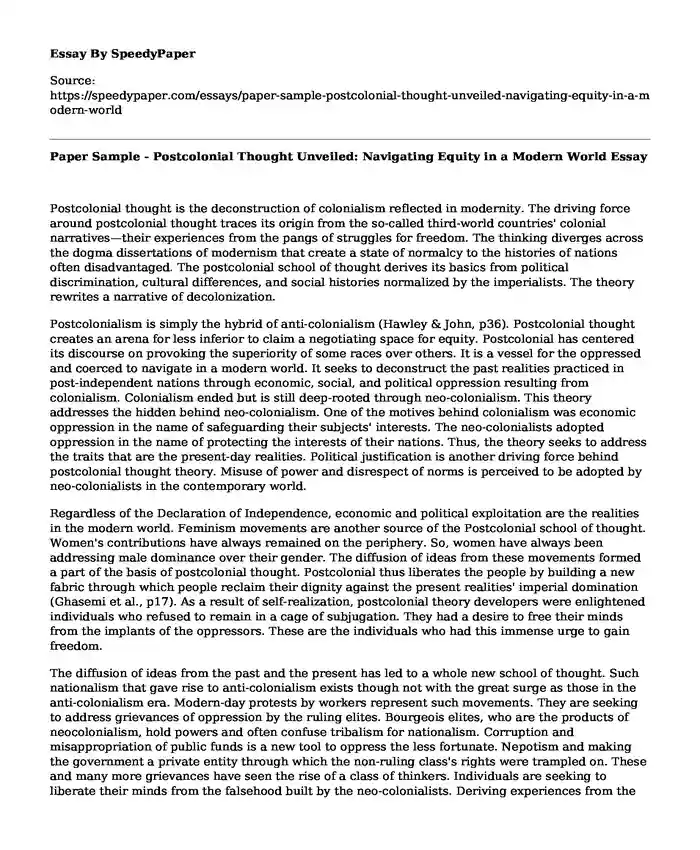Postcolonial thought is the deconstruction of colonialism reflected in modernity. The driving force around postcolonial thought traces its origin from the so-called third-world countries' colonial narratives—their experiences from the pangs of struggles for freedom. The thinking diverges across the dogma dissertations of modernism that create a state of normalcy to the histories of nations often disadvantaged. The postcolonial school of thought derives its basics from political discrimination, cultural differences, and social histories normalized by the imperialists. The theory rewrites a narrative of decolonization.
Postcolonialism is simply the hybrid of anti-colonialism (Hawley & John, p36). Postcolonial thought creates an arena for less inferior to claim a negotiating space for equity. Postcolonial has centered its discourse on provoking the superiority of some races over others. It is a vessel for the oppressed and coerced to navigate in a modern world. It seeks to deconstruct the past realities practiced in post-independent nations through economic, social, and political oppression resulting from colonialism. Colonialism ended but is still deep-rooted through neo-colonialism. This theory addresses the hidden behind neo-colonialism. One of the motives behind colonialism was economic oppression in the name of safeguarding their subjects' interests. The neo-colonialists adopted oppression in the name of protecting the interests of their nations. Thus, the theory seeks to address the traits that are the present-day realities. Political justification is another driving force behind postcolonial thought theory. Misuse of power and disrespect of norms is perceived to be adopted by neo-colonialists in the contemporary world.
Regardless of the Declaration of Independence, economic and political exploitation are the realities in the modern world. Feminism movements are another source of the Postcolonial school of thought. Women's contributions have always remained on the periphery. So, women have always been addressing male dominance over their gender. The diffusion of ideas from these movements formed a part of the basis of postcolonial thought. Postcolonial thus liberates the people by building a new fabric through which people reclaim their dignity against the present realities' imperial domination (Ghasemi et al., p17). As a result of self-realization, postcolonial theory developers were enlightened individuals who refused to remain in a cage of subjugation. They had a desire to free their minds from the implants of the oppressors. These are the individuals who had this immense urge to gain freedom.
The diffusion of ideas from the past and the present has led to a whole new school of thought. Such nationalism that gave rise to anti-colonialism exists though not with the great surge as those in the anti-colonialism era. Modern-day protests by workers represent such movements. They are seeking to address grievances of oppression by the ruling elites. Bourgeois elites, who are the products of neocolonialism, hold powers and often confuse tribalism for nationalism. Corruption and misappropriation of public funds is a new tool to oppress the less fortunate. Nepotism and making the government a private entity through which the non-ruling class's rights were trampled on. These and many more grievances have seen the rise of a class of thinkers. Individuals are seeking to liberate their minds from the falsehood built by the neo-colonialists. Deriving experiences from the past, post-colonialist challenges from the past are replicated in the modern world. Post-colonialist thought creates a sense of self-realization that revolutionizes people's minds into a world of liberty and equity.
Works Cited
Hawley, John C. "Postcolonial Theory." (2015). https://scholarcommons.scu.edu/engl/112/
Ghasemi, Parvin, Samira Sasani, and Fatereh Nemati. "Third Space, Hybridity, and Colonial Mimicry in Fugard's Blood Knot." (2018). https://www.researchgate.net/publication/339397998_Third_Space_Hybridity_and_Colonial_Mimicry_in_Fugard's_Blood_Knot
Cite this page
Paper Sample - Postcolonial Thought Unveiled: Navigating Equity in a Modern World. (2024, Jan 05). Retrieved from https://speedypaper.com/essays/paper-sample-postcolonial-thought-unveiled-navigating-equity-in-a-modern-world
Request Removal
If you are the original author of this essay and no longer wish to have it published on the SpeedyPaper website, please click below to request its removal:
- Free Essay Sample on Retirement Depression
- Free Essay on Healthcare Provider Faith Diversity: Christianity and Buddhism
- Essay Sample on Friedmanite Corporate Social Responsibility
- Free Essay on Battle Royal - Text Analysis
- Free Essay: African American History Across Social-Cultural Perspective
- Essay Sample on Complexities in the Late 19th Century and the Impact of World War II
- Love Is More Powerful Than Hate: Essay Sample for Inspiration
Popular categories





